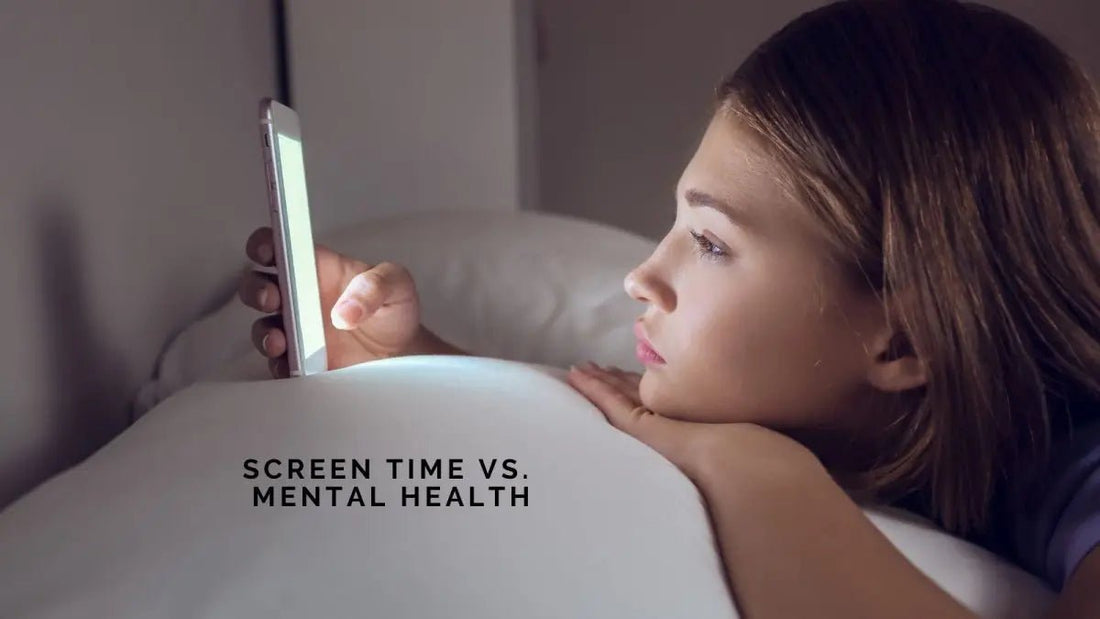
How Screen Time and Bedroom Tech Habits Impact Mental Health (and How to Break the Cycle)
Share
Let’s talk about that little habit many of us have—grabbing our phones the second we hop into bed, telling ourselves, “Just five more minutes!” Whether it’s scrolling through Instagram, catching up on emails, or binging TikTok, those minutes often turn into hours.
But have you ever thought about what all that screen time—especially at night—is doing to your mental health? Spoiler alert: it’s not pretty. The good news? You can make small, manageable changes to cut back on screen time and create healthier tech habits without feeling like you’re giving up your lifeline.
Let’s dive into the nitty-gritty of why those late-night scroll sessions might be harming your mental well-being and how you can fix it.
Hidden Effects of Screen Time on Your Mental Health
It Messes With Your Sleep Cycle. Ever heard of melatonin? It’s the hormone your body produces to signal it’s time to sleep. But here’s the catch: the blue light emitted by screens—yes, your phone, laptop, and TV—tricks your brain into thinking it’s still daylight. This delays melatonin production, making it harder for you to fall asleep and stay asleep.
Poor sleep isn’t just about feeling groggy the next day. Over time, chronic sleep deprivation can lead to mood swings, increased stress, and even long-term mental health issues like anxiety and depression.
Doom-Scrolling Is Your Worst Enemy. Let’s talk about doom scrolling. This is when you endlessly scroll through negative or distressing content, like bad news, scary headlines, or worst-case-scenario predictions. While it might feel like you’re staying informed, it actually feeds your anxiety.
Why? Your brain gets stuck in fight-or-flight mode as it processes all that negativity. Instead of winding down for the night, you’re amping up your stress levels, making it nearly impossible to relax and fall asleep.
It Can Worsen Feelings of Loneliness. Ironically, being “connected” online can leave you feeling more disconnected in real life. The constant barrage of perfectly curated lives on social media can trigger feelings of inadequacy, loneliness, or even FOMO (fear of missing out). And when this happens in your bedroom—a space meant for rest and intimacy—it can erode your sense of safety and peace.
Breaking the Habit: How to Cut Down on Screen Time
The goal isn’t to quit screens entirely—that’s unrealistic in today’s world. Instead, it’s about building mindful habits that protect your mental health while still allowing you to enjoy your favourite apps and shows.
Ban Screens From the Bedroom. Make your bedroom a tech-free sanctuary. Charge your phone in another room and invest in an old-school alarm clock. Without the temptation of your phone within arm’s reach, you’ll be less likely to fall into late-night scrolling traps.
Create a Pre-Bedtime Ritual. Unplug 30–60 minutes before bed and replace screen time with calming activities. Whether it’s reading a book, journaling your thoughts, meditating, or doing some light stretching, find what helps you relax and make it a nightly routine.
Set Limits on Social Media. Take advantage of built-in screen time controls on your phone to set daily limits for apps that tend to suck you in. You can also try scheduling specific times during the day for checking social media so it doesn’t spill over into your bedtime.
Recognise Doom Scrolling and Stop It Midway. When you catch yourself doom-scrolling, pause and ask:
“Is this helping me feel better or making me feel worse?”
“Do I need this information right now?”
Often, the answer is no. If it’s hard to stop, try swapping the app for something more uplifting, like a podcast, a funny show, or an audiobook.
Use Night Mode and Blue Light Blockers. If you must use your devices at night, switch them to night mode, which reduces blue light. You can also wear blue light-blocking glasses for extra protection.
Why Cutting Back Is Totally Worth It
Here’s what you’ll gain by cutting back on screen time, especially before bed:
- Better sleep: You’ll wake up feeling rested and ready to tackle the day.
- Reduced anxiety: Less doom scrolling means fewer stress triggers.
- Improved mental clarity: A good night’s sleep helps you think more clearly and manage emotions better.
- Deeper relationships: By prioritising real-world connections over digital distractions, you’ll feel more connected to those around you.
Let’s Start Tonight
So, here’s your challenge: tonight, when you crawl into bed, leave your phone on the dresser—or better yet, in another room. Take a few deep breaths, reflect on your day, and let yourself unwind without a screen in sight.
Remember, small changes lead to big results. Let’s reclaim our evenings and prioritise our mental health. You deserve it.
Got your own tips for managing screen time or beating the doom scroll habit? Share them in the comments—I’d love to hear from you!
P.S. If you found this post helpful, don’t keep it to yourself. Share it with a friend who might need a reminder to unplug and unwind.